Covid-19 Australia: Victoria records 1622 cases, nine deaths; NSW records 1742 cases
NSW has recorded 1742 cases, the highest daily total recorded for the state since the pandemic began, as Victoria records more infections as Omicron spreads in Queensland.
Coronavirus
Don't miss out on the headlines from Coronavirus. Followed categories will be added to My News.
NSW has reported 1742 new Covid-19 cases and no new deaths on Thursday as daily infections continue to climb.
There are 192 people in hospital, with 26 in ICU.
Of the over 16 population, 93.3 per cent are fully vaccinated against the virus and 94.8 per cent have had at least one shot.
Health Minister Brad Hazzard said on Wednesday the virus’ reproductive rate had passed 1.5 with cases doubling every few days.
He said the state’s hospital system was well prepared but University of NSW public health researchers were forecasting a possible 25,000 daily infections in January on some modelling.
NSW COVID-19 update – Thursday 16 December 2021
— NSW Health (@NSWHealth) December 15, 2021
In the 24-hour reporting period to 8pm last night:
- 94.8% of people aged 16+ have had one dose of a COVID-19 vaccine
- 93.3% of people aged 16+ have had two doses of a COVID-19 vaccine pic.twitter.com/knbjCV5X8A
Meanwhile, Victoria recorded 1622 new Covid-19 cases and nine more deaths in the past 24 hours.
It is the highest number of daily infections since the state posted 1612 cases on October 11.
It comes after state officials backtracked on a major Covid restriction, keeping masks mandatory in all retail settings from Thursday.
The state government went back on the promise on Wednesday over concerns the new Omicron variant was spreading rapidly in the community.
Face masks will no longer be required at weddings, funerals or ceremonial settings.
Health Minister Martin Foley said the government needed to gather more information about the new variant before considering further changes to restrictions, particularly the mask requirements.
“Omicron has changed the landscape,” he said.
“Everything is of course subject to epidemiological conditions at the time, while we figure out exactly the best and rigorous advice, we just need to tread carefully and cautiously.”
More than 700 people were ordered into quarantine after officials confirmed an Omicron case visited two popular Melbourne nightclubs.
A person with the strain visited Sircuit Bar in Fitzroy between 9pm and about midnight on Friday before heading to The Peel Hotel in Collingwood between 11.30pm and 3am.
QLD HAS 22 COVID CASES; 3 OMICRON
Queensland has recorded 22 new cases of Covid-19 as the state prepares for further spread of the Omicron strain.
Health Minister Yvette D’Ath revealed the new Covid-19 cases on Thursday morning, 18 of which had been infectious within the community for one to seven days.
A further two have been identified in home quarantine and two in hotel quarantine.
The cases have been identified in Brisbane South, Brisbane North, Darling Downs, Gold Coast, Sunshine Coast, Townsville, West Moretwon and Wide Bay regions.
“The source of the virus for the majority is primarily interstate travel,” Ms D’Ath said.
There are now 67 active cases in Queensland, with three confirmed cases of Omicron in the state.
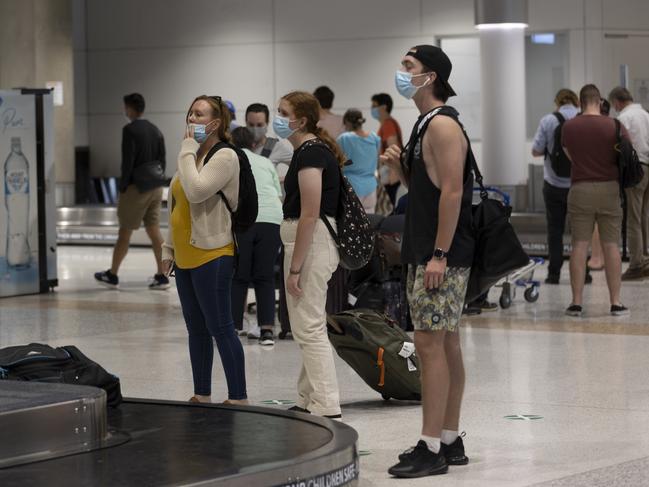
“We are expecting more Omicron cases to come forward,” Ms D’Ath said.
“The virus is rapidly escalating and it is spreading far quicker than Delta.”
One of the Omicron cases is a Townsville man who travelled on flights to Queensland after visiting a hotspot in Newcastle, one is a person who visited Newcastle’s Argyle House nightclub - the centre of an Omicron outbreak in NSW.
Another previously reported case from the UK also tested positive to the Omicron variant in hotel quarantine.
On Wednesday evening, Queensland Health released new exposure sites across South Brisbane, with a public health alert issued for new contact tracing locations in Sunnybank, Upper Mount Gravatt, and Cannon Hill.
CALL FOR URGENT BOOSTER CHANGE; WA SLAMS BORDER TO NSW
The country’s top epidemiologist says Covid booster shots should be made available just two months after Australians get their second vaccine, amid fears of growing case numbers.
Currently, nearly 90 per cent of Australians are blocked from getting the much-needed booster shots - which studies show have been effective to stopping the new Omicron variant - thanks to the current five month waiting period.
Earlier this week, the government announced a mandatory waiting period earlier this week, dropped from six weeks.
However, some scientists are now recommending the period be cut back to just two months.
Professor Raina MacIntyre from the World Health Organisation told The West Australian that the effectiveness of boosters against Omicron were highlighted in an Australian first study on its effectiveness against variants.
She said third doses needed to be made available to Australians as quickly and effectively as possible to fight against the new variant.
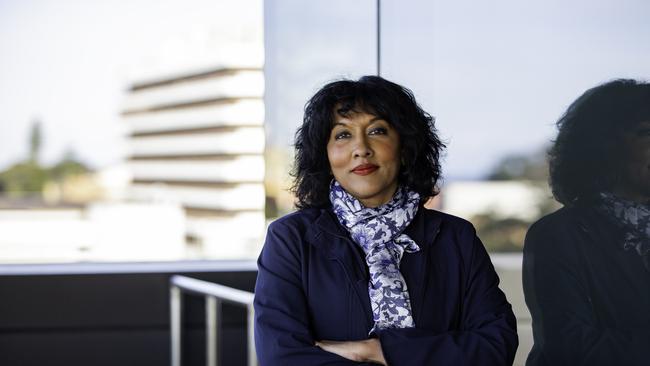
“A five-to-six month wait is a long time while cases are surging, and we need to proactively allow boosting at two-to-six months,” she told The West Australian.”
In NSW, cases have been increasing steadily over the past week — including Omicron cases— after another popular pub in Newcastle is put on alert.
The series of superspreader events in the city, which began when an infected person from a Sydney Harbour boat cruise went to a Newcastle club, has sparked urgent calls for boosters to be administered sooner.
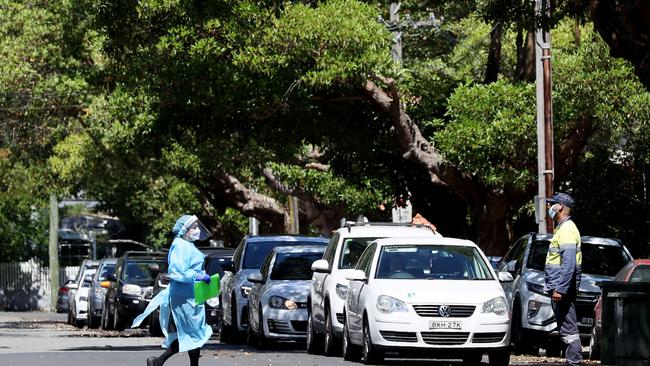
By Christmas Day, 84 per cent of Australian adults will still be blocked from getting their booster shot.
It comes as NSW Health predicted the state could see up to 25,000 cases a day by the end of January, while the Australian Medical Association warned the booster rollout isn‘t up to the job.
In the UK, Prime Minister Boris Johnson began rolling out a nationwide campaign this week to get all adults triple jabbed by New Year, with the waiting period currently at three months after a second jab.
WA TIGHTENS BORDER TO NSW
Western Australia’s has slammed its borders shut to all New South Wales residents, including those visiting dying relatives, as Premier Mark McGowan declares the state an extreme’ Covid risk jurisdiction.
The premier upgraded WA’s border control stance on Wednesday afternoon after NSW recorded a spike in case numbers, including more than 100 cases of the new Omicron variant.
From 12.01am on Saturday, NSW will join Victoria in moving from high risk to extreme risk under WA‘s controlled border regime.
Travel will not be permitted from NSW except under extraordinary circumstances, with approved travellers required to return a negative test, be double-vaccinated and undergo 14 days of hotel quarantine.
The situation in NSW right now is very concerning.
— Mark McGowan (@MarkMcGowanMP) December 15, 2021
Case numbers are rising rapidly following a number of super-spreader events. The NSW Government has eased restrictions on the unvaccinated, and their Health Minister is now predicting 25,000 cases per day by the end of January. pic.twitter.com/IV6vfrSBdU
It comes after WA recorded the first cases of the Omicron variant, detected in two returned overseas travellers who are currently in hotel quarantine.
Mr McGowan also urged West Australians in NSW with an approved G2G pass to return home immediately before the tougher restrictions kicked in.
“The situation in NSW is very concerning and the cases have rapidly risen in the past few days so we need to do everything we can to keep Western Australia safe, while we get WA‘s vaccination rate up to 90 per cent and remain free of Covid in the community,” he said.
“I implore everyone to get vaccinated and ensure they get their third doses when eligible.”
WA is due to reopen its borders on February 5 but the government has vowed it will take harsh measures in the meantime to keep the virus out.
PM IN COVID-19 SCARE AS NSW CASES SPIKE
Prime Minister Scott Morrison has tested negative to Covid-19 despite being exposed at a top Sydney school’s graduation ceremony on Friday.
The PM was a guest at Kincoppal-Rose Bay’s Graduation Gala at the International Convention Centre Darling Harbour on Friday, but the event was identified by NSW Health as a Covid exposure event on Tuesday with a warning issued for guests to get tested and isolate accordingly.
A statement from the Prime Minister’s Office on Wednesday morning confirmed Mr Morrison had been classified as a casual contact and had tested negative.
An infected person was one of 1000 who attended the gala.
The Prime Minister was pictured alongside performers Boys in the Band who said the “entire dance floor had been packed”.
But, a spokesperson for Mr Morrison said he had been tested twice since the event for Covid-19 and had not been directed to isolate.
The spokesperson said he would need to get another Covid test on Thursday.
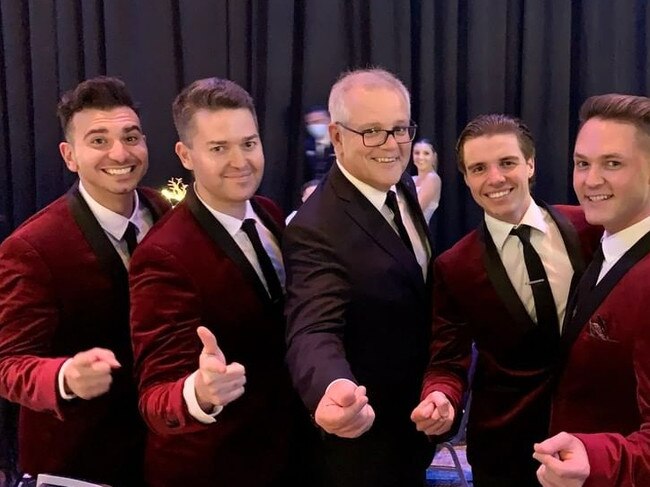
“Last night the Prime Minister was deemed a casual contact by NSW Health following attendance at an event last Friday night,” the spokesperson said on Wednesday morning.
“Since the event, the Prime Minister has received two negative PCR tests and as such (he has been) advised he is not required to isolate.
“As per the NSW Health guidelines, the Prime Minister will be tested again on day six.”
Additional advice had been sought by NSW Health and the chief medical officer prior to Mr Morrison’s hosting of Korean President Moon Jae-in at Kirribilli House on Tuesday night.
Mr Morrison will be in Queensland on Wednesday just days after the state opened its borders to Sydney for the first time since August.
VIC KEEPS MASK RULE, CHANGES JAB MANDATE
Shoppers will need to continue to wear masks in retail settings in Victoria, despite the government promising the rule would be relaxed if hospital admissions didn’t soar.
And Victoria’s vaccine mandate will be wound back in some settings, with people under 18 no longer subject to the jab requirements.
It comes as Victoria recorded 1405 new Covid cases and three deaths in the 24 hours to Wednesday.
When asked why the government won’t lift masks in retail after December 15 as first planned, Mr Foley said: “One word – Omicron. (It) has changed the landscape.”
Under the pandemic orders, restaurants, cafes, bars and pubs are still only open to fully vaccinated patrons and staff. Workers are required to wear masks.
Masks will no longer need to be worn at weddings, funerals, or ceremonial settings.
If these events are held at places of worship there will not be any vaccination requirements or limits on participants, nor any requirement to check vaccination status.
If the ceremony is at a hospitality setting, vaccine requirements will apply.
Workplaces exposed to a positive coronavirus case will no longer need to be deep cleaned, after mounting international evidence that coronavirus is an airborne or droplet-borne disease.
RESTRICTIONS WILL EASE DESPITE OMICRON FEARS: PM
A spike in Covid-19 infections and the gloomy mystery surrounding a new variant won’t burst Australia’s plans to ease restrictions ahead of Christmas, with Prime Minister Scott Morrison insisting “we have decided as a country to live with the virus”.
The emotional reunions at airport terminals across Queensland will evolve into sunseekers being welcomed throughout the summer despite Omicron cases confirmed among a list of new infections this week.
Health authorities across the Bass Strait followed suit, revealing those who travel to Tasmania from interstate will no longer need to isolate on arrival from Wednesday.
Despite an alarming spike in cases on Tuesday, with 804 new infections — a jump of 268 and the highest daily rise since early October, NSW will forge ahead with easing restrictions on Wednesday.
The state’s Health Minister Brad Hazzard declared density limits would be scrapped and masks would no longer be needed for most indoor venues, with the remaining restrictions applying to both vaccinated and unvaccinated.
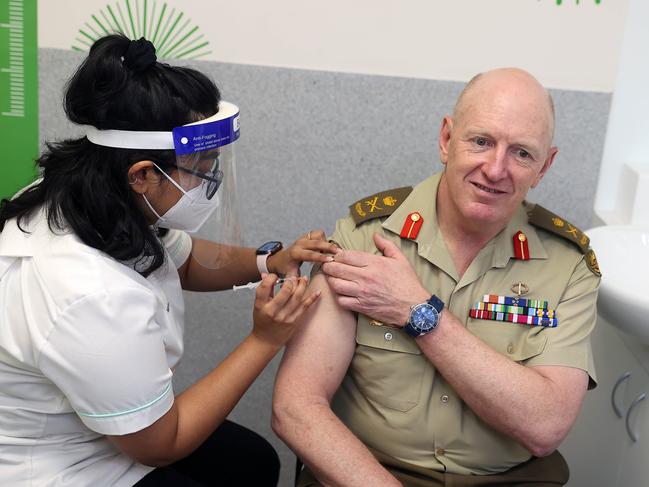
“What we’re planning on is making sure the community understands the need to be vaccinated and the need to have boosters,” he said.
The Prime Minister insisted his government was “very seriously” monitoring the potentially heightened risk of the Omicron variant but declared strict restrictions would not return.
“We’ve decided as a country to live with this virus and Australians have worked so hard for that,” he told reporters on Tuesday.
“When we have vaccination rates about to hit 90 per cent, one of the highest in the world, that means we have choices today that we didn’t have 18 months ago and that means that we can continue to move forward.”
Mr Morrison said Australia’s vaccine coverage had allowed policies to enter a new phase, where health responses were no longer dictated by the number of new cases.
“Cases are not the issue and I know over a period of time we may have become conditioned to case numbers being the trigger. That’s not the case,” he said.
The progression of restrictions easing was not extended out west, however, where West Australian Premier Mark McGowan confirmed on Monday the borders would remain closed until February 5.
GET JABBED OR MISS OUT, SAYS SA PREMIER
South Australians have been warned that those who aren’t fully vaccinated may not be able to do the same things in venues as those who are double jabbed.
While a blanket compulsory vaccination rule won’t be made by the government, Premier Steven Marshall on Tuesday said authorities were “looking closely” into restrictions at venues.
He said those that implemented a double jab requirement would have more freedoms.
The premier said venues had the capacity to consider having events just for the fully vaccinated on one particular day and then another on a separate day for those who don’t have the jab.
“There would a bit of complexity in regards to this,” Mr Marshall said.
“There are people who do have legitimate reasons why they can’t be vaccinated.
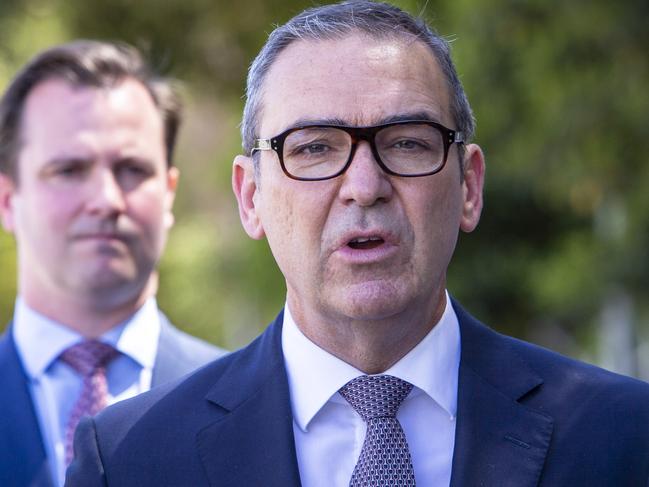
“My strong message is that it’s really important to get vaccinated now.
“We’re going to provide choice but there are increasingly more venues and individuals that don’t want to be out and about with people that are unvaccinated.”
He said SA was on track to reach the 90 per cent target by the end of the year when restrictions would ease further, but not before Christmas.
A number of major Adelaide venues have already implemented a mandatory vaccination requirement for all staff and patrons.
Currently, 91.2 per cent of South Australians have had at least one dose while 84.5 per cent are fully vaccinated.
SA recorded 12 new cases on Tuesday.
Of those, one was acquired interstate, five were locally acquired and are known contacts of a positive case, while six are still under investigation.
There are currently 70 active cases.
NSW MINISTER’S DISTURBING WARNING
NSW Health Minister Brad Hazzard has warned “never say never” about regional lockdowns in response to a Covid-19 outbreak in Newcastle.
Daily case numbers soared 50 per cent on Tuesday, driven largely by a nightclub superspreader event in the state’s Hunter region.
Mr Hazzard did not rule out reinforcing locally based lockdowns to quash any rapid spreads of infection.
“The one thing I’ve learnt that Health Minister in a pandemic, a one in 100 year pandemic is never say never,” he told ABC radio.
“So I can’t guarantee that it will always be that way.”
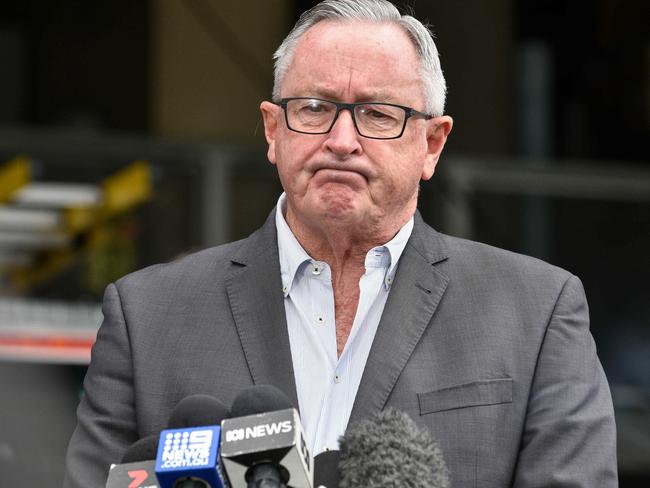
Mr Hazzard is also pushing for the federal advisory body on vaccines to change eligibility for booster shots to three or four months.
Mr Hazzard is reminding residents that immunity to Covid-19 drops “rapidly” three to four months after receiving both doses of the vaccine, especially for those over the age of 60.
“My view as Health Minister of NSW is that ATAGI (the Australian Technical Advisory Group on Immunisation) should be looking at that very closely, with regard to in fact bringing on the boosters at as early as three or four months,” Mr Hazzard said.
“Take it very seriously and get the booster shot. I’m very concerned that people are not actually understanding the benefit of getting the booster, a third shot of vaccine is going to make all the difference.”
MODERNA TO PRODUCE DOSES IN AUSTRALIA
Victoria will be home to the region’s largest producer of mRNA vaccines by the middle of the decade, after an in-principle agreement was struck with pharmaceutical giant Moderna.
In a deal set to be announced by Prime Minister Scott Morrison on Tuesday, the factory will be able to produce 25 million doses a year from 2024, and up to 100 million in a future pandemic.
Under the agreement, the factory will be able to produce Covid-19 vaccinations, yearly flu shots, as well as other therapies which can be used in the treatment of cancer, rare diseases, cellular engineering and protein-replacement therapy.
Currently, Australia relies on mRNA vaccines from Europe and the United States.
From 2024, Australia will be given priority access to any vaccines made in the factory, while a significant portion will be sent to Asian and Pacific nations.
Industry Minister Angus Taylor said it would be the only mRNA manufacturing plant in the region, aside from Singapore.
Mr Taylor said it would give Australia an opportunity to work with neighbouring countries.

“This gives us a capability which gives us enormous potential to deal with future pandemics, and also flu vaccines and potentially other vaccines as well,” he told Sunrise.
“It is very flexible technology, leading-edge, and Australia will be at the forefront in dealing with this disease, and will put us in a position where we are a manufacturer of our own vaccines.”
Mr Morrison said the factory was an “investment” considering the likely role mRNA technology would play in healthcare over coming years and how many lives it had already saved from Covid-19.
“This investment will continue to secure Australia’s future economic prosperity while protecting lives by providing access to world-leading mRNA vaccines made on Australian soil,” he said.
“The new mRNA manufacturing facility in Victoria will produce respiratory vaccines for potential future pandemics and seasonal health issues such as the common flu, protecting lives and livelihoods.”
The announcement comes days after Moderna’s Covid-19 booster shot was approved for use in Australia, with Health Minister Greg Hunt saying it was clear mRNA was an advancement the country needed to be a part of.
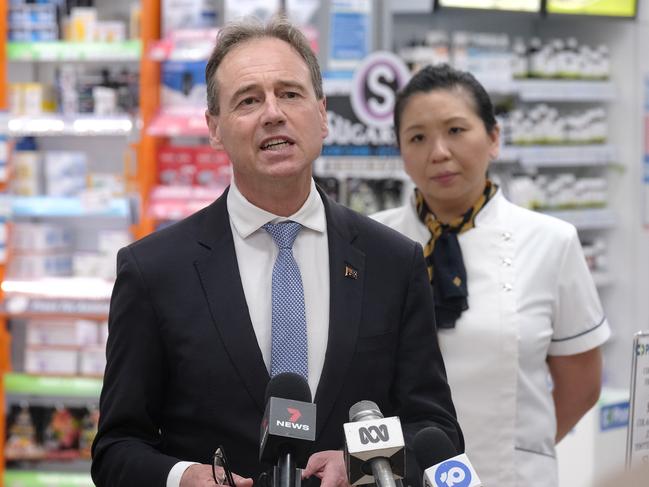
“Ensuring Moderna has a manufacturing presence here will deliver Australia priority access to products manufactured here in Australia, by Australians, for Australians, using the most cutting edge vaccination science available in the world today,” Mr Hunt said.
Victoria’s Acting Premier James Merlino said the deal would create 500 jobs during construction, and 500 ongoing jobs in what would prove instrumental in “driving the development of a local mRNA ecosystem that does not currently exist”.
“This is a huge announcement, not just for Victoria, but for the whole country – being able to manufacture mRNA vaccines and treatments locally will lock in vaccine security both on our shores and across our region,” he said.
‘LOCKED IN’: WHEN WA’S HARD BORDER WILL BE LIFTED
Western Australia’s borders will reopen on February 5 at 12.01am, after the state’s Covid vaccination rate reached 80 per cent double dose for those aged 12 and over.
Premier Mark McGowan finalised details of the “safe transition plan” at a meeting of his Emergency Management Team today.
He said this date was “locked in”.
“Even though Western Australians have lived a normal life inside our Covid free bubble, nearly 2 million people have done the right thing and gotten vaccinated,” he said.
“We followed a different model to the others. And it’s worked. I want to acknowledge each and every Western Australian for everything they’ve done over the past two years.”
From February 5, any international arrivals will need to return a negative PCR test result within 72 hours of departure and undertake a PCR test within 48 hours of arrival in Perth, as well as six days after arriving.
Double vaccinated visitors will have no need to quarantine.
For those who are not double vaccinated or have received a vaccine unrecognised in Australia, they will have to go into a hotel or dedicated quarantine facility.
Domestic arrivals must be double vaccinated unless they have a valid exemption.
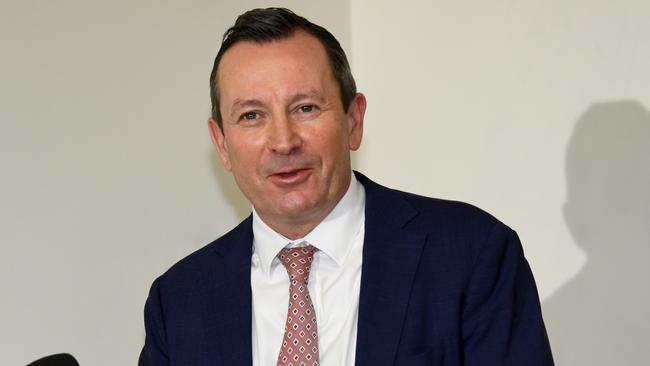
Visitors will still be required to return a negative PCR test result within 72 hours of departure and undertake a PCR test within 48 hours of arriving in Perth.
If a traveller’s stay in WA is for five days or less, they will only be required to return a negative PCR test result within 72 hours of departure, and won’t need to get another test within 48 hours of landing.
As of Monday, WA was closed to all states and territories except Tasmania.
He also said the state’s quarantine cap for unvaccinated international arrivals could be limited to fewer than 100 people per week.
An exact number had not yet been determined, but that “it may be down at 100 or perhaps less per week”.
Mr McGowan has said even if WA doesn’t meet the ambitious target of 90 per cent fully vaccinated, the state would reopen.
Currently, Victoria is rated “extreme risk” and NSW “high risk”. South Australia and the ACT are “medium risk”. Travellers from medium, high, and extreme risk jurisdictions are not permitted to enter unless approved.
Tasmania is rated “very low risk” and NT “low risk”, meaning anyone entering from these regions are subject to conditions, including completing a G2G Pass (external link) declaration prior to entry.
And from today, Queenslanders can arrive in WA but must self-quarantine for 14 days.
International arrivals must complete 14 days quarantine at a government facility at their own expense.
QLD REOPENS
Here is what you need to know about the Queensland border reopening.
What about people coming from declared hotspots?
If you have been in a hotspot in the past two weeks, you may travel to Queensland if you are fully vaccinated, have a negative Covid-19 PCR test within 72 hours prior to arrival and get tested on day five.
Travellers can arrive by road or air, and do not need to quarantine.
Queensland residents or anyone relocating to the state who does not meet the criteria must arrive by air and complete two weeks of hotel quarantine.
What about Queensland residents travelling to and from the NSW border zone?
You do not need to provide a negative test result to cross the border.
Queensland residents entering the NSW border zone must only stay there for as long as needed to do that activity.
The restriction does not apply if you are fully vaccinated and travelling between Queensland and the non-restricted NSW border zone.
What if you are coming from anywhere else in Australia that is not a hotspot?
There are no restrictions for these travellers, including no quarantine requirement.
What if you are coming from overseas?
If you are on an international flight, you must arrive at Brisbane International Airport and be an Australian citizen or permanent resident, or an immediate family member travelling with one.
You must also be fully vaccinated, have a negative result within 72 hours before departure and undertake two weeks of home quarantine within two hours drive of the airport.
Anyone else living there must also complete quarantine and have at least one dose of a vaccine.
What if you are arriving from overseas via another state or territory?
You must be fully vaccinated and undertake the Queensland period of quarantine under the direction of another jurisdiction at home or in a government-nominated facility.
If you arrive into Australia via a hotspot, you must complete two weeks of hotel quarantine in Queensland.
However, if you only transit through an airport in a hotspot, you are considered to have arrived directly into Queensland.
AUSTRALIA’S BOOSTER OPTIONS
Australians now have a choice between two Covid-19 booster jabs after the nation’s vaccine immunisation advisory body gave the Moderna booster the green light.
The Australian Technical Advisory Group on Immunisation on Sunday approved Moderna to join Pfizer as the preferred vaccine for booster doses.
It does not matter what vaccine a person received as part of their first Covid-19 vaccine course.
It comes as ATAGI approved reducing the wait between the second vaccination and the booster shot down to five months.
Around 670,000 Australians have already received a booster shot.
Health Minister Greg Hunt said Australia was well prepared ahead of an expected increase in demand for booster shots.
“Australia’s booster program is supported by more than 151 million Pfizer, Novavax and Moderna vaccines secured for supply into the future,” Mr Hunt said.
“Australia is well prepared to provide booster doses as approvals are provided by the medical experts.”
Speaking to reporters on Sunday, Mr Hunt said: “With one of the highest vaccination rates in the world, with one of the lowest rates of loss of life and one of the strongest economic recoveries, Australia is doing incredibly well, but the shorter time for boosters, the extra booster option … gives Australians more access, earlier access, and more confidence that despite all of the challenge we’ll get through it”.
Health department secretary Brendan Murphy added: “There’s evidence that by six months there is some declining protection to Omicron and so ATAGI felt that there was a good reason to get people boosters if possible before that 6-month mark so they felt bringing it forward to five months was worth doing.”
Just last week Chief Medical Officer Paul Kelly said ATAGI had ruled there was not enough evidence to support shortening the time frame between the second dose and a booster shot.
“There is no evidence to suggest, at the moment, that an earlier booster does of the current Covid-19 vaccines, will augment the protection against the omicron variant,” Professor Kelly said.
But after more data about the Omicron variant and vaccine efficacy became available, the advice changed.
Data from Israel shows boosters supporting reductions in the rate of infection in eligible age groups, severe disease in those aged over 40 years and deaths in those over 60 years.
Victoria’s chief health officer Brett Sutton said there was an “urgent need” for people to get extra protection from the virus.
“Thanks ATAGI,” he tweeted.
“There is an urgent need for third doses/boosters. Don’t delay if you’re due. I’ll now get mine before Christmas.”
WA TIGHTENS BORDER RULES
Anyone hoping to get into Western Australia from Queensland will be required to quarantine for 14 days, after the state announced tighter border controls from Monday.
From 12.01am, Queensland will be elevated from ‘very low risk’ to ‘low risk’ under WA’s controlled border rules.
It means travel is only permitted for visitors who are double dose vaccinated, can present for a Covid-19 test on arrival (within 48 hours) and on day 12 and can self-quarantine for 14 days in a suitable place.
They must also complete a G2G Pass prior to arrival, saying they do not have any Covid-19 symptoms and state where they have visited in the previous 14 days.
WA visitors will be met at the border checkpoint for a health screening and have their G2G Pass checked before going to their self-quarantine.
Anyone who arrived in WA between December 1 and 12.01am and December 13 and has been to a listed exposure site is also required to self-quarantine for 14 days and be tested immediately (within 48 hours) and at day 12.
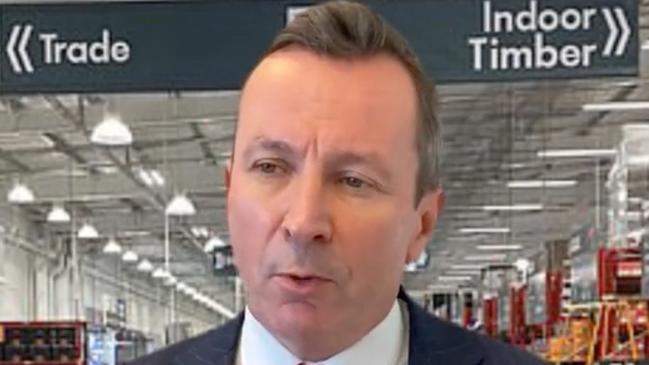
The WA Government said the new risk level comes after the “escalating situation” in Queensland where there has been community spread of the virus.
Failure to follow the new border controls could lead to penalties ranging from $1,000 up to $50,000 fines for individuals.
It also comes ahead of Queensland’s plan to introduce relaxed quarantine requirements with other states which have Covid-19 cases from Monday.
WA Premier Mark McGowan said the stricter risk level was necessary as some cases in Queensland have an unknown source.
“With community spread now being experienced in Queensland and its expected move to relax border controls and quarantine arrangements with Covid-positive jurisdictions, in the midst of Omicron, we need to take caution and strengthen our border controls with Queensland,” he said.
“This will inconvenience people, however we know border controls work to keep WA safe and they’re effective in managing the risks of Covid-19 entering the community, while we don’t yet have sufficient levels of vaccination coverage.”
“As I’ve said, in coming days we expect to reach our 80 per cent double dose vaccination rate which means we can review the situation and confidently lock in a future date to proceed with our Safe Transition Plan next year.
“This is a timely reminder to get vaccinated. It will protect you, your family and your community.”
– Emily Cosenza, Duncan Murray
Originally published as Covid-19 Australia: Victoria records 1622 cases, nine deaths; NSW records 1742 cases




